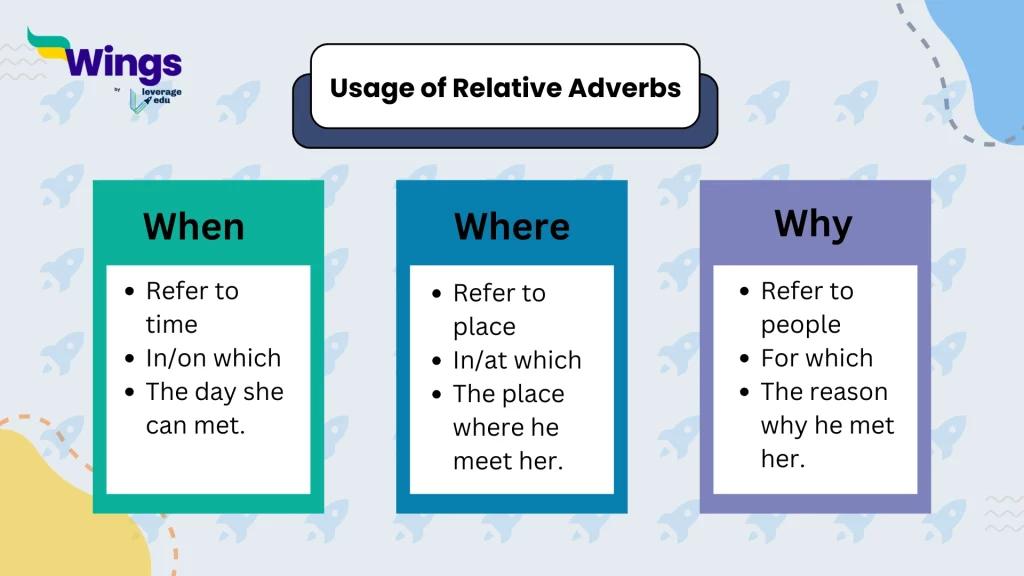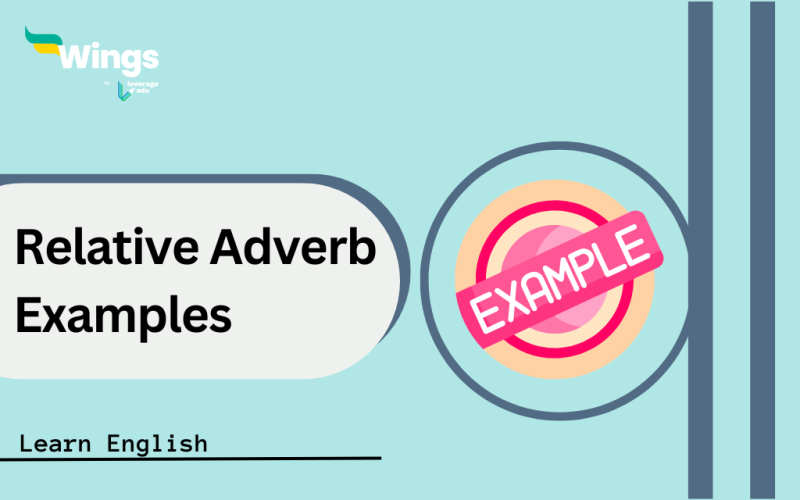Relative Adverb Examples: In the English language, a relative adverb is a kind of adverb that introduces a relative clause and relates it to the remaining part of the sentence. Moreover, it is a type of subordinating conjunction that introduces an adverb clause. The three common relative adverbs are where, when, and why, describing adverbs of place, time, and reason, respectively. In this blog, students will be able to understand the concepts of relative adverbs with the help of examples.
This Blog Includes:
Relative Adverb with Examples
They act similarly to relative pronouns but rather than replacing a noun, they modify the verb in the relative clause. Here are the types of adverbs with examples:
Where
The relative adverb where is utilised to refer to location, meaning that the noun preceding where will denote some location such as a country, state, city, building, or stadium.
Examples: She visited the cafe where they had their first date.
Do you know where the nearest hotel is located?
When
The relative adverb when used to denote time, means that the noun preceding when will mean some measurement of time like moment, minute, hour, day, week, month, and era.
Examples: We’ll never forget the day when we went for a trip in the mountains.
Do you remember the time when they used to play in the garden until dark?
Why
The relative adverb why is used to show the reason (for something). This adverb modifies noun phrases including the noun reason.
Examples: Can you explain the reason why they arrived late to the conference?
She understands why you’re upset, but there’s nothing I can do to change the situation.
Read more: Types of Adverbs: Use, Examples & Exercises

Also read: Guide on Relative Adverbs: Meaning, List, and Usage with Examples
17+ Relative Adverbs Examples
Below are some relative adverbs examples that students can use in their writing and spoken English:
- The place where she first met is now a popular restaurant.
- Can you tell me the purpose why they want to join this meeting?
- Is this the restaurant where he had his birthday dinner?
- That’s the explanation for why they had to cancel the meeting.
- That’s the method whereby we achieve our goals.
- Do you remember the moment when he climbed to the top of the hill?
- Do you know the reason why he resigned from his position?
- I can’t forget the time when we watched the sunrise together.
- The method whereby she solves this problem is quite simple.
- This is the point where he needs to make a decision.
- That’s the method whereby they achieve their goals.
- This is the situation wherein they find themselves.
- This is the reason why she needs to conserve water.
- She couldn’t remember the place where she left her keys.
- I could not understand the reason why he made such a decision.
- He described the reason why he was late for the meeting.
- Let me explain the context wherein this idea arose.
- Can you clarify the point where we’re supposed to meet on Sunday?
- I don’t understand the process whereby this machine operates.
- That’s the place where they used to go for picnics.
Related reads
FAQs
Parents, nieces, uncles, cousins aunts, siblings, grandparents and nephews are all relatives. A relative can be related to your family through blood or by marriage.
The four types of relative adverbs are when, where, how, and why. Whereas “when” modifies r describe.
“How” is not a relative adverb because relative adverbs join “a dependent clause to an independent clause while modifying the clause of which it is a part,” and relative adverbs.
This was all about the relative adverbs examples in English grammar. Hope you understand the concept and know how to proceed. You can also follow the page of Leverage Edu for more exciting and informative blogs.


 One app for all your study abroad needs
One app for all your study abroad needs












 60,000+ students trusted us with their dreams. Take the first step today!
60,000+ students trusted us with their dreams. Take the first step today!